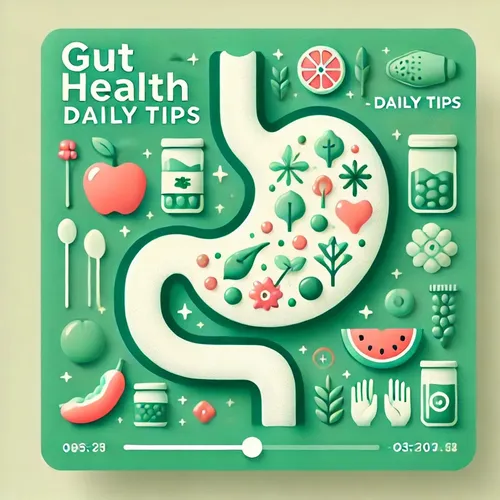Unlock the Power of Gut Health: Your Pathway to Optimal Wellbeing
- Author
- Quiet. Please
- Published
- Sat 30 Aug 2025
- Episode Link
- https://www.spreaker.com/episode/unlock-the-power-of-gut-health-your-pathway-to-optimal-wellbeing--67558552
Gut health is a cornerstone of overall well-being, influencing not just digestion, but also immunity, mental health, and even weight management. The human gut harbors trillions of bacteria and microorganisms, collectively known as the gut microbiome. Maintaining a balanced microbiome is crucial for optimal health, and there are several strategies to achieve this harmony.
Firstly, incorporating a diverse range of fiber-rich foods is essential. Fiber acts as a prebiotic, feeding the beneficial bacteria in the gut. Fruits, vegetables, whole grains, and legumes are particularly beneficial. For example, apples, artichokes, and oats have high fiber content and support the growth of health-promoting bacteria like Bifidobacteria.
Another important aspect of gut health is minimizing processed foods and added sugars. These can feed harmful bacteria and disrupt the microbiome balance. Instead, focus on whole, unprocessed foods that provide essential nutrients and foster a healthier gut environment.
Fermented foods are another key element for enhancing gut health. They are naturally rich in probiotics, which are live beneficial bacteria. Including foods like yogurt, sauerkraut, kimchi, kefir, and kombucha in your diet can introduce helpful bacteria into your digestive system. These foods can aid digestion, boost immunity, and even help control inflammation.
Hydration also plays a role in maintaining gut health. Adequate fluid intake supports the mucosal lining of the intestines and facilitates nutrient absorption. Drinking plenty of water ensures that fiber can do its job effectively, preventing issues like constipation and promoting a smooth passage through the digestive tract.
Stress management is vital for gut health as well. Chronic stress can negatively impact the gut by altering its microbiome composition and increasing gut permeability. Incorporating stress-reducing practices such as meditation, deep breathing exercises, and regular physical activity can mitigate these effects. Ensuring adequate sleep is another important factor in stress management and overall gut health.
Supplementing with probiotics can also be beneficial, especially after taking antibiotics, which can disrupt the gut's natural flora. Probiotic supplements come in various strains and potencies and can help replenish the gut microbiome. However, it’s crucial to choose high-quality supplements for the best results and consult a healthcare provider if necessary.
Lastly, paying attention to food intolerances is important. Foods that cause adverse reactions can harm the gut lining and lead to chronic inflammation if continually consumed. Keeping a food diary to identify triggers and eliminating offending foods can improve symptoms and promote gut healing.
In summary, improving gut health requires a multifaceted approach involving dietary changes, lifestyle adjustments, and mindful consumption. By focusing on variety, incorporating fermented foods, staying hydrated, managing stress, considering probiotics, and avoiding trigger foods, one can cultivate a healthy and resilient gut microbiome, leading to better health outcomes.
For more http://www.quietplease.ai
Get the best deals https://amzn.to/3ODvOta
